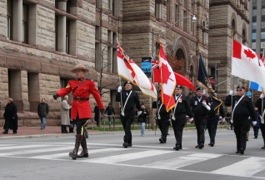11:00 on November 11th marks a rare moment when a city of five and a half million people can be unified by shared experience and shared thoughts. Walking back to work after today’s Remembrance Day ceremony, I was struck by the number of people adorned with poppies, many of whom, like me, seemed lost in their thoughts. I am touched by the experience and the significance of this bond, although I know it is a brief, passing one.
I was struck, too, by the words that ran through my head, the words to “In Flanders Fields”, which I, like many Canadians, memorized many years ago as a student, the words which always come to mind when I think of this day: “We are the dead/ Short days ago we lived, felt dawn, saw sunset glow/ Loved and were loved, and now we lie/In Flanders Fields.” These words are a sobering reminder of how we should cherish life, how fortunate we are just to be alive.
Today’s ceremony brought my thoughts back to the book The Hunger Games, which I had just finished reading. I find dystopian novels fascinating, partly because their relevance strikes at unexpected moments. This YA novel takes place in a future North America, where adolescents from outlying districts are forced to fight to the death in the annual Hunger Games, as punishment for a past revolution against the centralized powers of the capital city. The novel explores the protagonist’s struggle with the ethics of killing while she fights for her life. The central concept of The Hunger Games seems so terribly savage, and yet there are uncomfortable parallels with the practice of sending young men (and now, young women) to another country to die for our ideals or, worse, for our politics. Amid the speeches and hymns and poems this morning, I thought about what it might feel like to suffer the pain of a friend’s death, all the while knowing that your duty is to inflict this same experience on others. It made me wonder where our humanity lies, and where it ends, and how it is that civilized societies throughout history have inflicted their members with the task of destroying life.
In our moments of silence today, we are called to express solemn gratitude to those who have passed away in their efforts, and to the protection and freedom which they have granted us. While I consider what it must be like to be caught in the throes of war, I can’t help but think of that other Remembrance Day poem, which instead of calling the reader to “take up our quarrel with the foe” dares us to reconsider: Dulce et Decorum Est.
Dulce et Decorum Est
by Wilfred Owen
Bent double, like old beggars under sacks,
Knock-kneed, coughing like hags, we cursed through sludge,
Till on the haunting flares we turned our backs,
And towards our distant rest began to trudge.
Men marched asleep. Many had lost their boots,
But limped on, blood-shod. All went lame, all blind;
Drunk with fatigue; deaf even to the hoots
Of gas-shells dropping softly behind.
Gas! GAS! Quick, boys!–An ecstasy of fumbling
Fitting the clumsy helmets just in time,
But someone still was yelling out and stumbling
And flound’ring like a man in fire or lime.—
Dim through the misty panes and thick green light,
As under a green sea, I saw him drowning.
In all my dreams before my helpless sight
He plunges at me, guttering, choking, drowning.
If in some smothering dreams, you too could pace
Behind the wagon that we flung him in,
And watch the white eyes writhing in his face,
His hanging face, like a devil’s sick of sin,
If you could hear, at every jolt, the blood
Come gargling from the froth-corrupted lungs
Bitter as the cud
Of vile, incurable sores on innocent tongues,–
My friend, you would not tell with such high zest
To children ardent for some desperate glory,
The old Lie: Dulce et decorum est
Pro patria mori.
Photos by Daniel Dillon
Danielcdillon@gmail.com


Hi, this is a comment.
To delete a comment, just log in, and view the posts’ comments, there you will have the option to edit or delete them.
LikeLike